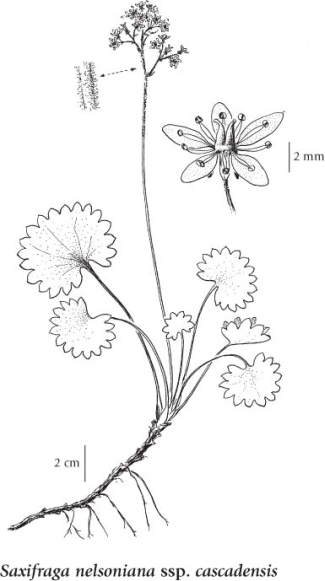Click on the image below to view an
expanded illustration for this species.

|
General:
Perennial herb from branched stem-bases with rhizomes; flowering stems 10-30 cm tall, mostly smooth below, long-hairy above.
Leaves:
All basal, kidney-shaped, 1.0-7.7 cm wide, 1/2 to 4/5 as long, coarsely 7- to 21-toothed, the teeth up to 1 cm long, the leaves smooth, sparsely or stiff-hairy near the base, sometimes fringed, the stalks long, 1- to 5-times blade length.
Flowers:
Inflorescence a many-flowered, terminal, congested or open panicle with appressed or ascending hairs, the lowest branch often from leaf-like bracts; petals white to pink, 2.5-4 mm long, oblong, the tips rounded to notched, slightly clawed, deciduous; calyces lobed nearly to base, slightly joined to the base of the ovary, free hypanthium absent, the lobes egg-shaped to narrowly egg-shaped, 1-2 mm long, green to purplish, fringed, bent back; stamens 10.
Fruits:
Capsules; 3-12 mm long, purplish, tips spreading to bent; seeds brown, about 0.8 mm long, ridged lengthwise with pimples.
Notes:
Four intergrading subspecies occur in BC.
1. Largest leaves mostly with 9 to12 teeth; capsules 6-12 mm long; plants of the Queen Charlotte Islands, adjacent mainland and Coast Mountains of NW BC.................... ssp. carlottae (Calder & Savile) Hult.
1. Largest leaves mostly with 12 to 18 teeth; capsules 3-8 mm long; plants of mainland BC.
2. Panicles open, the hairs appressed; plants slender; plants of SW BC..................... ssp. cascadensis (Calder & Savile) Hult.
2. Panicles often congested, the hairs ascending; plants robust; plants of N BC and the Rocky Mountains.
3. Largest leaves 2.3-7.7 cm wide, slightly fringed and stiff-hairy near the leaf stalks; capsule cleft 25-60%; plants of NW BC ...........................ssp. pacifica (Hult.) Hult.
3. Largest leaves 1.0-3.8 cm wide, smooth or sparsely hairy; capsule cleft 40-75%; plants of N BC north of 56degreeN........................... ssp. porsildiana (Calder & Savile) Hult.
Source: The Illustrated Flora of British Columbia
|
